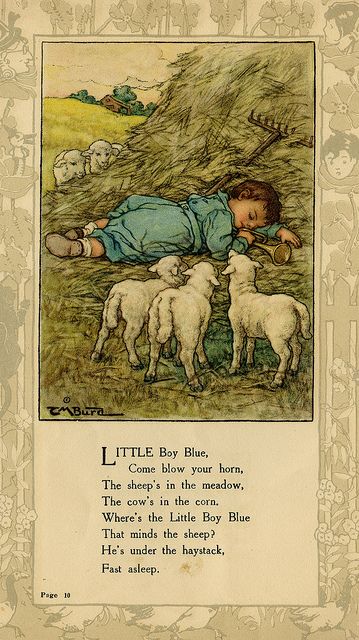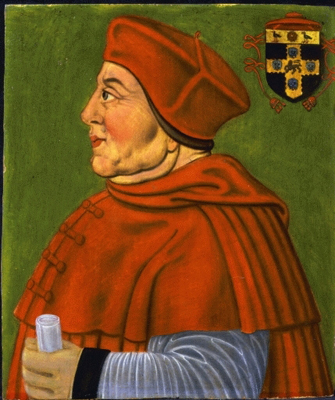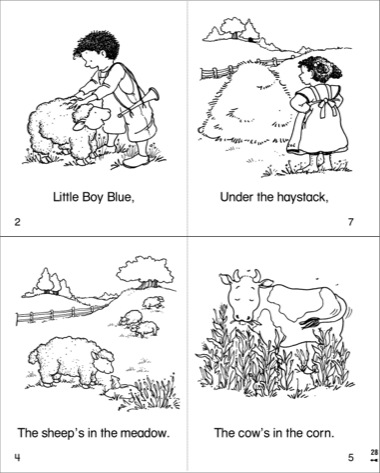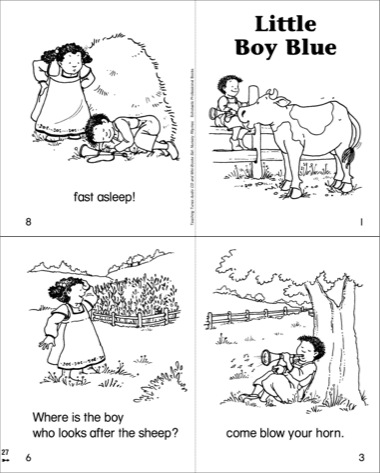第四个黑人的唱法很是有趣。
|
A Little Boy Blue come blow your horn,
The sheep's in the meadow
the cow's in the corn.
But where's the boy
who looks after the sheep?
He's under a haystack fast asleep.
Will you wake him? No, not I
- for if I do, he's sure to cry
|
|
歌曲来源及背景: the Little Boy Blue故事源头- 都铎历史演绎?
仅从字面和内容来判定歌曲的历史背景是肯定不行的,但是据推测 'Little Boy Blue' 影射都铎王朝亨利八世时期的红衣主教(Cardinal)托马斯·沃尔西Cardinal Thomas Wolsey (1475-1530),沃尔西自负、傲慢、好虚荣和贪图享乐的人物,他地位显赫,极端富有,生活奢侈(ostentatious),并为此洋洋得意。沃尔西早年在牛津马德兰学院受教育,15岁便取得了文学士学位。也有说是他在牛津买到学位,被人称为"Boy Bachelor" ,而"Blowing one's own horn"意为自吹自擂便指沃尔西。在1514和1525年间不断修建私邸汉普敦宫,其极为豪华。据统计,他的年收入达3.5万镑,大约相当于王室全部收入的1/4。在一个时期里,他的财富仅次于国王而居全国第二位。政敌们传言:
"Come ye to court? Which Court?
The King's Court or Hampton Court?"
1529年11月,亨利八世召开国会,顺利地通过了剥夺沃尔西公民权和财产的法令。沃尔西立即屈服,他交出了财产,放弃了几乎全部僧俗官职,只保留了约克大主教的职位。这一时期英国征收羊毛税和出口税获取大量财富充实国库和沃尔西的腰包。歌词 "where's the boy who looks after the sheep?"便说的是财富在沃尔西手中而非国库。 作为红衣主教沃尔西的纹章却是四只蓝脸猎豹(leopard) - 也许这就是称为Little Boy Blue的原因吧? The Little Boy Blue隐晦传播他掌管权势是贪恋钱财之事。另一首与其相关的儿歌是Old Mother Hubbard。
最早版本为《 Tommy Thumb's Little Song Book 》(c. 1744), 歌词很陈旧. 莎士比亚的《李尔王》 (III, vi) 中埃德加装扮成疯子汤姆时说:
Sleepest or wakest thou, jolly shepheard?
Thy sheepe be in the corne;
And for one blast of thy minikin mouth
Thy sheepe shall take no harme.[1]
词语溯源:
meadow [ ˈmedəʊ ] 草地; 牧场
中古英语medwe<古英语mædwe ,与此相关是mead“草地”
Cardinal [ ˈkɑ:dɪnl ] 基数; 红衣主教; 大红色,深红色; 女式斗篷
源自拉丁语 cardinālis=cardin- (cardō的词干) hinge中枢、关键点, hence, something on which other things hinge + -ālis -al“具有该属性的”; cardinalis "principal, chief, essential,"
forfeit [ ˈfɔ:fɪt ] (因违反协议、犯规、受罚等)丧失,失去 ;罚金,没收物,丧失的东西; 代价
中古英语forfet < 古法语(forfaire过去分词 to commit crime, to lose possession or right through a criminal act) < 中古拉丁语forīs factum penalty, forīs过去分词 facere to transgress, =forīs outside, wrongly + facere to make, do
leopard [ ˈlepəd ] 豹; 美洲豹,金钱豹,花豹
拉丁语 leopardus字面意思"lion-pard,"<希腊语leopardos,=leon "lion" + pardos "male panther“豹子”"
ostentatious [ ˌɒstenˈteɪʃəs ] 好夸耀的,炫耀的; (态度)自负的; 讲排场的,铺张的; 外观美丽的,浮华的
拉丁语 ostentationem "showing, exhibition, vain display," ostentation + -ous,ostensible“假装的”= ostens-, =ob "in front of" + tendere "to stretch"



